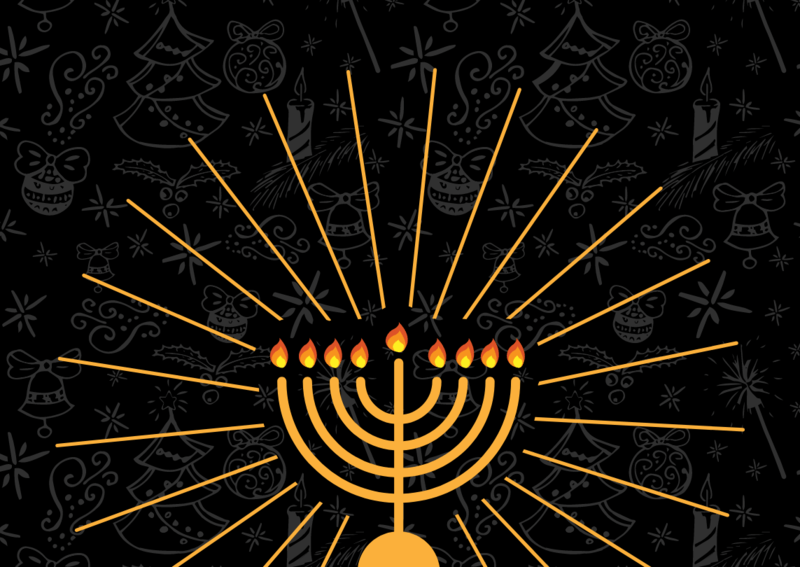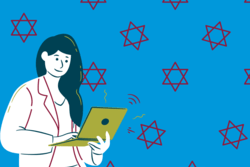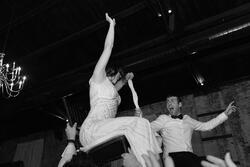Creating Hanukkah Rituals in Quarantine
“Interfaith” doesn’t feel like the right word for my family. My father’s family is indubitably Jewish, but my mother’s family is more ambiguous. My maternal grandparents belong to a Congregational church, where they have been heavily involved in charity work, and enthusiastically celebrate Christmas and Easter, though with only token references to the holidays’ religious origins. I guess this may be enough to technically qualify us as interfaith. But using this label feels like a false equivalence. While I have struggled with feeling Jewish enough, I can say confidently that I have never felt Christian. I guess you could say that my family is interfaith, but I’m not. I’m just Jewish.
Even though I feel this separation from Christianity, religious or cultural, I feel incredibly close to my family. My mother’s side is important to me and so are these holiday traditions: a progressive dinner on Christmas Eve, sleeping over at my grandparents’ house, waiting impatiently as one waffle at a time made its way out of the waffle iron. I look forward to Christmas in the same way, and for the same reasons, as most of my non-Jewish peers. Only the carols full of explicit Christian religious references made me uncomfortable as a child.
As I got older, and more involved with Judaism, I became more uncomfortable with the fact that I celebrated Christmas. In sixth grade, I joined my synagogue with absolutely no experience in any Jewish space outside of my family. I struggled to fit in and felt ashamed of all the Jewish experiences and religious school memories that I lacked. The fact that I celebrated Christmas seemed like a dirty secret. I felt like a bad Jew for participating in the holiday, despite how secular it was for my family and despite the fact that in recent years 58 percent of all newly married Jewish people are in interfaith relationships.
This guilt didn’t come from hurtful comments, though there were moments in which my synagogue clearly failed my “interfaith” family. But even my internal shame speaks to the work we still must do to validate interfaith families and the Jews who are part of them, to make us feel more comfortable, and, ultimately, to ensure the continuation of the Jewish community.
Over the years, I’ve thrown myself into Jewish community, leadership, and learning. I’ve discovered a multitude of Jewish stories, and in roles such as creating Jewish programming or writing essays about Jewish topics, I’ve become the person whose job it is to foster inclusion. But the Christmas Question has not gone away.
Of course, this is not a problem unique to me, or even unique to those in similar situations. In American culture, it can be virtually impossible to escape Christmas celebrations. This means that many Jewish people, regardless of their family backgrounds, have to reckon with this moral conflict of Christmas or no Christmas, and the potential feelings of exclusion if they don’t celebrate. In fact, my family celebration probably makes this season easier for me. It certainly prevented me from feeling alienated as a kid.
Over time, my confidence in my Jewish identity has grown enormously, making it so even though I no longer feel the same guilt over participating in my family’s celebration, I am even more interested in a Jewish-centered holiday season. I am just Jewish, and I don’t really want to be anything else. I don’t like how hegemonized Christianity is in American culture. I think it has dangerous implications, and I know part of my Jewish journey and identity is finding ways to resist this assimilation, even when it’s hard.
This year, COVID-19 has totally disrupted my holiday rituals, along with about everything else in the world. With COVID rates skyrocketing and the seasons changing, even outside meet-ups are becoming unrealistic, and celebrating a normal Christmas with my family has become impossible.
I am not quite sure where this all leaves me. I will still be home for Christmas, and my family will also be reckoning with not maintaining this beloved tradition. My extended family is only a Zoom call away, and we will very likely participate in Christmas celebrations in some form. But the pandemic has created a situation that I always vaguely imagined for the future. A situation in which, my traditional Christmas removed, I can find a new version of the holidays. A year where the normal obligations of school and work, that usually hinder Hanukkah celebrations with their alignment to a Christian calendar, are greatly reduced in my life thanks to an extended winter break.
My family has always made latkes and lit the menorah, but what would it look like for me to dig a little more into Hanukkah? What would it look like to not only finally achieve the ultimate goal of lighting the candles every night, but to take the time to sit together and watch them burn?
There are a few key elements that feel essential to retain in my holiday celebrations: quality time, food, and gift-giving. The length of Hanukkah provides a new opportunity to expand on these traditions. There is time to not just be with immediate family but to reach out to extended family and friends. Instead of just eating together, we can cook together, or try out new and exciting dishes.
I’m also excited to observe a winter holiday that is not just a fun celebration but also has deep religious meaning. For me, Jewish holidays have always been tied closely with spirituality and reflection, whereas during Christmas, I made a point to ignore the day’s religious significance. I want Hanukkah to feel like a party, but I also want to make space for a conscious deeper meaning through family discussions, daily journal practices, and simply knowing that I am practicing a holiday of my ancestors.
I have a lot of learning, thinking, and growing to do around my Judaism, particularly when it comes to the holidays. This reckoning will certainly last a lifetime, but in a strange way, COVID-19 is the perfect time to make the change from grappling with my guilt to figuring out what I want the holidays to look like.






